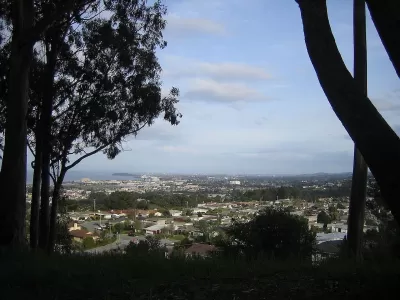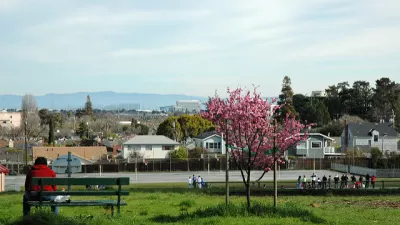Next year, California voters will determine whether to repeal a 1950 initiative that requires local voter buy-in for government-supported low income housing, but that hasn't deterred Millbrae from using it to sue San Mateo County.

The housing dispute pits Millbrae, a city of just over 23,000 residents located adjacent to San Francisco International Airport, against San Mateo County, population 764,000, located between San Francisco and Santa Clara counties on the San Francisco Peninsula.
“When San Mateo County supervisors agreed in September to buy a Millbrae motel to convert to homeless housing, neighbors were furious that the county had pushed through the plan over their safety concerns,” writes Ethan Varian, a housing reporter for the Bay Area News Group in a subscriber-only article for The Mercury News on December 8.
Now Millbrae is suing to halt the project [pdf], alleging the county’s $33 million purchase of the La Quinta Inn violated a 73-year-old amendment to the state constitution that requires local governments to get voter approval before developing, buying, building or funding “low rent housing.”
California Constitution Article XXXIV
The constitutional amendment, known as Article 34: Public Housing Project Law, resulted from the passage of Proposition 10, an initiative sponsored by the California Real Estate Association, in 1950.
Article 34 posts in Planetizen include:
- Opinion: California's Article 34 Drives Segregation and Cripples Affordable Housing. It's Time To Repeal It, March 17, 2022
- California Voters Could Repeal Amendment Long Hampering Public Housing, January 9, 2020
- A "white supremacist" law that blocks public housing in the state is up for repeal—again, February 20, 2019
The top post, a Los Angeles Times editorial, explains why the next two posts on an earlier legislative attempt didn't proceed, and the delay in putting the current measure on the ballot.
[L]awmakers have been hesitant to put the Article 34 repeal on the ballot. An attempt was dropped in 2020 and revived this year for the 2022 ballot, but it may be postponed until 2024.
The hurdle isn’t politics. It’s money. Advocates are struggling to raise the estimated $20 million necessary to run a successful statewide campaign to educate voters on California’s ugly history of housing discrimination.
Enabling legislation
The November 2024 ballot measure results from the passage of Senate Constitutional Amendment (SCA) 2, on Aug. 31, 2022, written by Sen. Ben Allen (D-Santa Monica). Ballotpedia notes that in September 2023, "the state legislature passed Senate Bill 789 (SB 789) to move the amendment from the March 5 primary ballot to the November general election ballot.”
Note that next year's ballot measure is a legislatively referred constitutional amendment while the original 1950 ballot measure was an initiated constitutional amendment.
Fourth time's a charm?
“Three past efforts to repeal or weaken Article 34 all failed — the last attempt was in 1993 — a fact Millbrae officials highlighted in a news release,” adds Varian in the source article. [Related Millbrae news flash, November 16].
Ballotpedia notes that the prior attempts were in 1974 and 1980. “All three measures were defeated by voters with at least 58.93% or more of the vote.” As of December 12, it notes that it “has not located a campaign in opposition to the ballot measure.” Their webpage also shows the Senate and Assembly votes last year on SCA 2: unanimous, no votes in opposition.
FULL STORY: Is Millbrae using a ‘racist’ amendment in the state constitution to block homeless housing?

Maui's Vacation Rental Debate Turns Ugly
Verbal attacks, misinformation campaigns and fistfights plague a high-stakes debate to convert thousands of vacation rentals into long-term housing.

Planetizen Federal Action Tracker
A weekly monitor of how Trump’s orders and actions are impacting planners and planning in America.

In Urban Planning, AI Prompting Could be the New Design Thinking
Creativity has long been key to great urban design. What if we see AI as our new creative partner?

King County Supportive Housing Program Offers Hope for Unhoused Residents
The county is taking a ‘Housing First’ approach that prioritizes getting people into housing, then offering wraparound supportive services.

Researchers Use AI to Get Clearer Picture of US Housing
Analysts are using artificial intelligence to supercharge their research by allowing them to comb through data faster. Though these AI tools can be error prone, they save time and housing researchers are optimistic about the future.

Making Shared Micromobility More Inclusive
Cities and shared mobility system operators can do more to include people with disabilities in planning and operations, per a new report.
Urban Design for Planners 1: Software Tools
This six-course series explores essential urban design concepts using open source software and equips planners with the tools they need to participate fully in the urban design process.
Planning for Universal Design
Learn the tools for implementing Universal Design in planning regulations.
planning NEXT
Appalachian Highlands Housing Partners
Mpact (founded as Rail~Volution)
City of Camden Redevelopment Agency
City of Astoria
City of Portland
City of Laramie





























